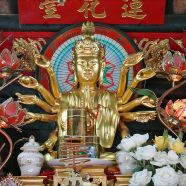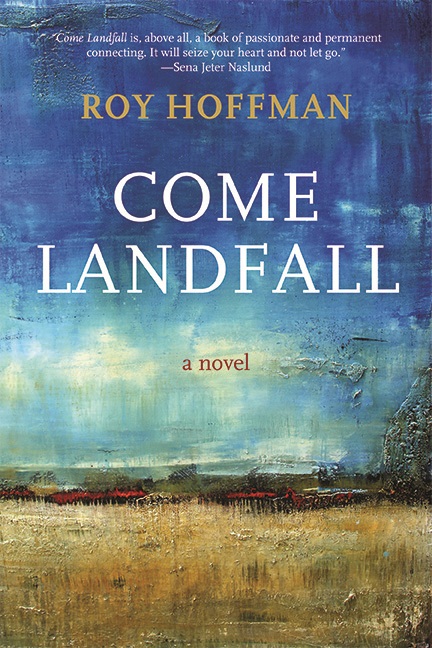
Quan Am dans la pagode au pilier unique (Hanoi). Photo by Jean-Pierre Dalbéra. http://tinyurl.com/kmgx8dn
Share This
Print This
Email This
Come Landfall
Excerpted from the novel Come Landfall (University of Alabama Press, 2014)
From Chapter 2
Men in Uniform
At the Nguyens’ house on Oak Street in the early morning, three blocks from casino row, sunlight washed through the den that held objects precious to Phi Nguyen, Cam’s father. In frames on the wall were Cam’s honor roll certificates, a color photo of Cam as a little girl with her mother, Kieu, in front of Fancy Nails in Biloxi, and a black-and-white snapshot of her sister, Mai, as a toddler in Saigon. On a table was Bodhisattva Quan Am, a two-foot-tall statue that Phi had stuck into his duffel when the family was fleeing Vietnam, long before Cam was born on Mississippi soil. That Hurricane Isidore had turned west two days before, then bore out to sea, was the goddess’s bidding.
Cam had heard the story countless times of the tumultuous voyage on the South China Sea. Despite the tragedies that befell them, Daddy believed that, thanks to the goddess of mercy, they had not all drowned. Quan Am’s face was lovely, delicate, her eyes all-seeing. Unlike the Buddha, who had transcended this world, Quan Am had stayed behind to show the way to her and others. At St. Benedict’s, her friends had Jesus, and Cam had Buddha, but who matched their Mary? “Quan Am is more powerful than Mary,” she had told them the first week of school. “A man was about to get his head cut off with a sword and asked Quan Am for help and the sword broke apart. Could Mary do that?”
On his knees, bending low, Daddy thanked Quan Am for sending Isidore away, then asked her to guide the spirits of Mai and Kieu, to keep them from being troubled. They had died years apart but their souls were linked, daughter and mother.
Supplicant beside him, Cam caught the smell of the shrimp boat on his neck and shoulders, in his mashed-up shirt. She tried to breathe evenly and clear her mind of all earthly concerns, as she had been taught.
She became distracted by Quan Am’s hair—plaits woven neatly. If she fixed her hair like that, might Daddy open his eyes to see her, his living daughter, rather than always paying homage to Mai? He pushed her to work harder, yes, make top grades, especially in math and science, and excel in music as her mother had. But it was she, after all, who could communicate with her sister´s spirit. Still, he made his pleas to the Bodhisattva, much as the teachers in the Christian school made theirs to the crucifix in chapel.
Daddy said he sent her to St. Benedict’s because Catholic Charities had enabled them to come in America and root into the Deep South through the refugee resettlement program, making no demands on their Buddhist faith. But Cam knew it was because he believed the public schools, with their swaggering boys in baggy pants and sneakers, their girls with short skirts and bare midriffs, were no place for a young lady. The parochial school, he believed, was her protection. The priest in charge assured Phi that Cam’s own religion would be respected, and dutifully Daddy took a wad of cash four times a year to pay the tuition. She did not tell him that she was preached to often, and took turns reading aloud in chapel from the Gospels like the other girls. If anything, being of a different religion seemed to quicken their interest in her, like she was a project to undertake. Whatever it took, she prized their attention.
There were two other Vietnamese girls at her school, but one had parents who’d become Baptists in a Philippine refugee camp, and the other, the child of an unknown American soldier, was just, well, weird. A Chinese girl a grade below said that the Bodhisattva’s name was Quanying, but Cam told her it was Quan Am. They’d gone on the Internet together and seen that the goddess had both names, depending on the culture. In China, she sat on the head of a dragon. In Vietnam, she rested on a lotus blossom. Quan Am would shield her whatever came.
From Come Landfall: A Novel by Roy Hoffman © 2014 by Roy Hoffman. Used with permission of The University of Alabama Press.








Beautiful Roy! Can’t wait to read the rest.
Just read from Chapter two… so beautifully written. Looking forward to your book. You have writing some wonderful essays for the NY Times… what a good year for you. Congratulations. Sonya